SP Senator Eric Smaling observer at Albanian elections
SP Senator Eric Smaling observer at Albanian elections
This week I fulfilled a teenage dream - to visit Albania and at the same time to do so as an election observer. Back then I was fascinated by the country's isolation. The Communist autocrat Enver Hoxha succeeded in draping this small country in its own iron curtain for forty years after the Second World War. During the de-Stalinization of the Soviet Union under Khrushchev he even changed course, moving towards Mao. Looking at the map I don't really understand how that was possible, with holiday destinations like Yugoslavia, Greece and Italy a short walk or swim away.
by SP Senator Eric Smaling
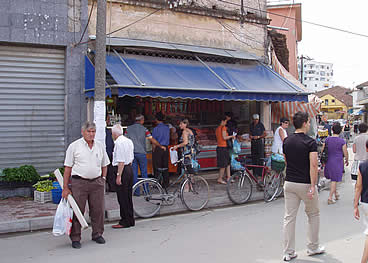
There is little left from those days and I have not spoken to anyone who is nostalgic for them. Albania wants to move forward and rightly so, though it is doing this in fits and starts. Corruption is rife, but there is certainly also evidence of development, and the country played a strategic role during the crisis in the Balkans. This put it in the United States' good books, without upsetting many others. Within a short period of time it lost its big neighbour Yugoslavia and got Macedonia, Kosovo and Montenegro in return. In these countries and in Greece live many people of Albanian origin, but Albania has not used this to lay claims to any territory. As for Kosovo, that it will have to unite with Albania is not spoken of, despite their common history. Nevertheless there is currently a motorway under construction from Pristina to the Albanian coast. That there is a sense of solidarity between the two countries is clear. Macedonia is seen by its neighbours Bulgaria and Greece as a country without foundations, an invented construct with no right to exist. Albania is keeping its options open, seeking only good neighbourly relations. Recently the country became a member of NATO and has applied to join the European Union. The anticipated economic prosperity works like a magnet and each successive prime minister wants to get the credit for accession. Whatever may be our opinion of the unbridled expansion of the EU, seen from the Albanian point of view it is completely understandable that they wish to become a member.
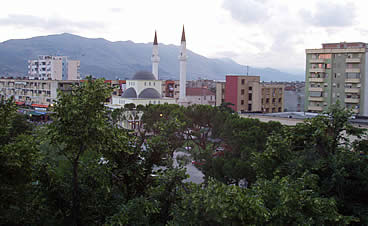
A view of Shkodra
I was in Albania as a member of the parliamentary assembly of the Organisation for Security and Cooperation in Europe (OSCE). Eight Dutch parliamentarians sit in this assembly, one of whom is the SP's foreign affairs spokesman Harry van Bommel. The OSCE is principally active in the Balkans, the Caucasus and Central Asia, and its main goal is to support countries in this region in their striving for democracy, economic development and respect for human rights. In still fragile states such as Bosnia and Kosovo, a major representation of the OSCE is active, which also functions as a means of smoothing relations between military UN peacekeeping missions and national and local governments. One of the OSCE's more important tasks is to supervise and monitor elections. As an observer, then, on election day you attend polling stations to keep a close eye on what people are doing. After the vote, a common report is made to the leader of the delegation who calls a press conference. For Albania it is of the utmost importance that the final judgement prove positive. If not, the country can forget EU membership for the foreseeable future.
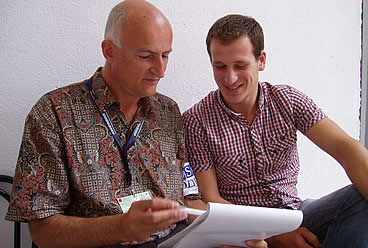
Explaining our work to a young election supervisor from the Albanian Socialist Party
Last Friday and Saturday we were given information on the elections by people from the OSCE who had already been in Albania for some time and who had analysed the whole process running up to the vote. Bad reports regarding the media: newspapers have little impact because channels of distribution are poor, while on television there have been absolutely no debates between rivals. Eventually the principal players arrived to meet us: the Premier and the leader of the opposition. Two parties dominate: the Democratic Party and the Socialist Party. Albania has a president, but the Premier Sali Berisha is the most important player, and he is from the Democratic Party. With a voice hoarse with campaigning, he told us all about the good work he had done in the last few years, about the need for an honest and fair election and about the high degree of openness during the campaign. The opposition leader Edi Rama, of the Socialist Party, is also mayor of Tirana, an artistic type who unfortunately used his time mainly to complain about his opponent. He had not been invited to debate on television; many polling booths were to be located in bars, restaurants and offices with connections to the DP; the electoral rolls were full of dead people, which would enable any ballots unfilled when the polling booths closed to be stamped with a DP vote, etc, etc. No doubt some of this was true, but it would also have been nice to hear just what he stood for.
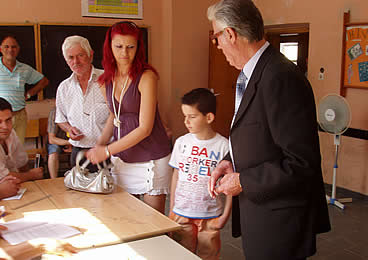
Three generations of voters

Just getting a taste of what it's like to stand in the queue
Observers always work in pairs. Saturday afternoon I left for Shkoder, a town in the north on a magnificent lake. I was with Max, an Austrian MP from Karinthia, from the party which split with Haider. This must have been the people who decided who would pair with whom having a laugh. The man was also a farmer, a hotelier and the mayor of his town. Still, cooperation went well, as his bad jokes were bearable and his English amusing.
At half past six we were ready at the polling station where we would be present for the official opening. Although we were made welcome, our presence added to the stress for the people running the show. After this we went from polling station to polling station, all over town and into the countryside. Everything went more or less smoothly, though we did sometimes see people signing with the same surname who looked suspiciously alike; not everyone queued in an orderly fashion; a man 'helped' his wife to cast her vote; one person suddenly became very angry; and some polling stations were so small that you could easily see where a voter was putting his or her cross. As far as the emancipation of women is concerned, there remains, shall we say, work to be done. There was never more than a single woman in the seven-person team which ran each polling station. Late in the evening back in Tirana we heard the others' tales: one all het up about a single incident, the other emphasising that so little had gone badly. As far as that goes, we could do no more than conduct a sample test.
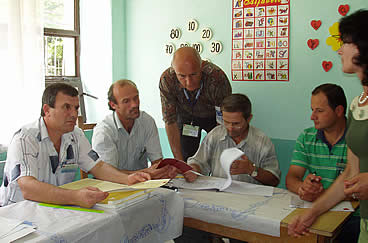
Looking over the shoulder
Now it's Monday, noon, and there are still ballots to count, but in Shkoder it was in my view an excellent election day. A neck-and-neck result is predicted between DP and SP, but what's most important is that Albania should emerge a winner, that a visible step has been taken towards a mature and transparent democracy. This could also perhaps persuade Albanians outside Albania to return to the country to aid its further development and contribute to a stable future for the Balkans.
